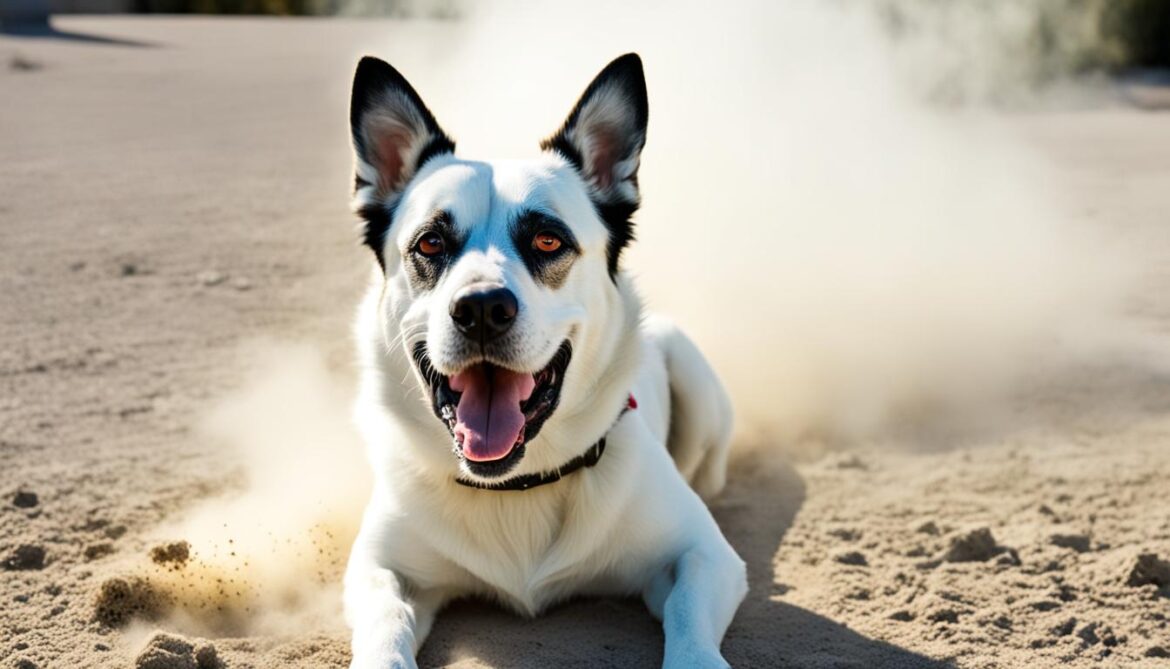Asthma in dogs is a respiratory condition that, while less common than in cats, can still affect our furry friends. It is an allergic disease characterized by allergic reactions to irritants, causing inflammation and constriction of the airways. Just like humans, dogs can experience symptoms of asthma, such as a persistent cough, difficulty breathing, wheezing, and loss of energy.
Diagnosing asthma in dogs requires a thorough physical examination by a veterinarian, who may also recommend additional diagnostic tests like x-rays. Treatment options for dogs with asthma typically involve anti-inflammatory steroid medications to control symptoms and, in some cases, inhalers to improve breathing.
Preventing asthma attacks in dogs involves identifying and avoiding triggers such as pollen and cigarette smoke. By understanding the symptoms, diagnosis, and treatment options for asthma in dogs, pet owners can ensure the well-being of their beloved companions.
Key Takeaways:
- Dogs can develop asthma, an allergic disease that causes inflammation and constriction of the airways.
- Symptoms of asthma in dogs include coughing, difficulty breathing, wheezing, and loss of energy.
- A veterinarian can diagnose asthma in dogs through a physical examination and additional diagnostic tests.
- Treatment options for dogs with asthma include anti-inflammatory steroid medications and inhalers.
- To prevent asthma attacks, identifying and avoiding triggers is crucial, such as pollen and cigarette smoke.
Symptoms of Asthma in Dogs
The symptoms of asthma in dogs can vary, but some common signs indicate the presence of the condition. If you notice any of these symptoms in your furry companion, it is essential to seek veterinary care for proper diagnosis and treatment.
- Persistent cough: Dogs with asthma often have a persistent cough that may resemble a honking sound or hacking.
- Loss of energy: Asthmatic dogs may exhibit a decrease in energy levels and seem less active or lethargic.
- Difficulty breathing: Dogs with asthma may experience sudden difficulty in breathing, making it look like they are struggling to catch their breath.
- Rapid breathing: Asthmatic dogs may exhibit rapid and shallow breathing, which can be a clear indication of respiratory distress.
- Heavy panting with mouth wide open: Dogs with asthma often pant heavily and keep their mouths open wider than usual to try to alleviate breathing difficulties.
- Wheezing: Wheezing, a high-pitched whistling sound with each breath, is a common symptom of asthma in dogs.
- Bluish colored gums: Due to restricted oxygen flow, dogs with asthma may develop bluish gums, indicating insufficient oxygenation.
- Loss of appetite: Asthmatic dogs may experience a decreased appetite or show disinterest in food.
If your dog exhibits any of these symptoms, it is crucial to consult a veterinarian for an accurate diagnosis. Keep in mind that these symptoms can also be caused by other serious conditions, so it is essential not to self-diagnose and seek professional guidance.
Diagnosis and Treatment of Asthma in Dogs
To accurately diagnose asthma in dogs, a thorough physical examination by a veterinarian is crucial. This examination helps rule out other potential causes of the symptoms, such as heartworm disease or bacterial infections, ensuring an accurate diagnosis. In some cases, additional diagnostic tests like x-rays or heartworm testing may be recommended to gain a better understanding of the dog’s condition.
Once the diagnosis is confirmed, the treatment of asthma in dogs focuses on managing symptoms and preventing long-term lung damage. Anti-inflammatory steroid medications are commonly prescribed to control inflammation in the airways, reduce episodes of coughing and wheezing, and improve breathing.
In more severe cases, veterinarians may prescribe inhaler medications to directly target and improve the dog’s breathing. Inhalers deliver medication directly to the lungs, offering quick relief and reducing the overall systemic side effects.
It is important to note that medications should never be administered to dogs without consulting a veterinarian. Many human medications can be toxic or have adverse effects on dogs, underscoring the need for professional guidance.
“Timely diagnosis and proper treatment are essential in managing asthma in dogs. By working closely with a veterinarian, pet owners can ensure their furry companions receive the necessary care to alleviate symptoms and improve their quality of life.”
Preventive Measures for Dog Asthma
Aside from medication, managing asthma in dogs also involves taking preventive measures to minimize the risk of asthma attacks. Identifying and avoiding triggers that can induce these attacks is of utmost importance.
- Avoid exposing the dog to environmental irritants such as pollen, mold, cigarette smoke, and certain cleaning products.
- Ensure the dog’s living environment is clean and free from dust, mold, and other allergens that can exacerbate symptoms.
- Keep the dog away from areas with heavy pollution or high levels of airborne irritants.
- Follow a regular exercise routine to promote lung health and overall well-being.
- Collaborate closely with the veterinarian to monitor the dog’s condition, adjust treatment plans if necessary, and ensure optimal respiratory health.
By implementing these preventive measures and staying vigilant about the dog’s respiratory health, pet owners can provide their furry friends with a better quality of life and minimize the impact of asthma on their overall well-being.
| Diagnosis of Asthma in Dogs | Treatment for Asthma in Dogs |
|---|---|
| Thorough physical examination | Anti-inflammatory steroid medications |
| Additional diagnostic tests (e.g., x-rays, heartworm testing) | Inhaler medications (in more severe cases) |
| Identification of potential triggers | Veterinary guidance and monitoring |
Managing Dog Asthma and Preventing Attacks
Managing dog asthma involves identifying and avoiding triggers that can induce asthma attacks. Common triggers include pollen, mold, cigarette smoke, and certain cleaning products. If the cause of the dog’s asthma attacks is known, it is best to remove the allergen from the environment to reduce the frequency of attacks. Minimizing the dog’s exposure to the irritant can help prevent asthma attacks.
Regular veterinary check-ups are essential to monitor the dog’s condition and adjust treatment methods if necessary.

Dogs with asthma require ongoing management to ensure their respiratory health. Here are some tips for managing dog asthma and preventing attacks:
1. Identify and Avoid Triggers
It is important to identify the specific triggers that cause asthma attacks in your dog. Common triggers include:
- Pollen
- Mold spores
- Cigarette smoke
- Certain cleaning products
By minimizing exposure to these triggers, you can help prevent asthma attacks in your dog. This may involve avoiding certain environments or making changes in your home.
2. Keep the Environment Clean
Regularly clean your home to reduce allergens and irritants that can trigger asthma attacks. Vacuum regularly, wash bedding and toys, and use air purifiers to improve air quality.
3. Maintain a Healthy Lifestyle
A healthy lifestyle can help manage dog asthma. Provide a balanced diet, regular exercise, and maintain a healthy weight for your dog. A strong immune system can help reduce the frequency and severity of asthma attacks.
4. Follow Veterinarian Recommendations
Work closely with your veterinarian to develop an asthma management plan for your dog. They may prescribe medications such as anti-inflammatory steroids to control symptoms and prevent long-term lung damage. Follow their instructions regarding dosage and frequency.
Regular veterinary check-ups are crucial to monitor your dog’s condition and make any necessary adjustments to the treatment plan. Your veterinarian may perform diagnostic tests or suggest changes in medication based on your dog’s response.
By managing dog asthma and taking proactive measures to prevent attacks, you can help your furry friend live a comfortable and healthy life.
Canine Bronchitis – Similar Condition to Asthma in Dogs
In addition to asthma, dogs can also develop a condition known as allergic bronchitis, which shares similarities with asthma. Allergic bronchitis in dogs is characterized by inflammation and coughing triggered by environmental irritants. This condition can cause discomfort and respiratory difficulties for our furry companions.
Just like asthma, the symptoms of bronchitis in dogs can vary. Common signs include:
- A persistent, dry, or productive cough
- Wheezing
- Rapid and shallow breaths
- Open-mouth breathing
- Pale-colored gums
- Exercise intolerance
If your dog is exhibiting any of these symptoms, it is important to seek veterinary attention to accurately diagnose and treat the condition. Chest X-rays and other diagnostic tests may be performed to rule out other respiratory illnesses and confirm the presence of bronchitis.
Treatment for bronchitis in dogs often involves the use of anti-inflammatory steroids and other medications to reduce inflammation and help improve breathing. Your veterinarian will determine the most appropriate course of treatment based on the severity of the condition and your dog’s individual needs.
Remember, proper diagnosis and treatment are crucial for managing canine bronchitis and ensuring the comfort and well-being of your dog. If you suspect that your dog may be suffering from bronchitis, don’t hesitate to consult with your veterinarian for guidance and support.
Conclusion
Accurate diagnosis and appropriate treatment are crucial in ensuring the well-being of our canine companions with respiratory conditions such as dog asthma and canine bronchitis. By understanding the symptoms, diagnosis, and treatment options for these conditions, pet owners can promptly recognize signs of respiratory distress and seek proper veterinary care.
Managing triggers that can induce asthma attacks, such as pollen and cigarette smoke, can greatly improve the quality of life for dogs with respiratory conditions. Additionally, providing the necessary medical treatments, including anti-inflammatory steroids or inhalers, can help control symptoms and prevent long-term lung damage.
Regular veterinary check-ups and open communication with the veterinarian are essential for maintaining the long-term respiratory health of dogs. By staying proactive and vigilant, pet owners can ensure that their furry friends enjoy a happy and comfortable life free from the constraints of respiratory-related issues.
FAQ
Can dogs have asthma?
Yes, dogs can have asthma. It is an allergic disease that is less common than in cats.
What are the symptoms of asthma in dogs?
Symptoms of asthma in dogs include a persistent cough, difficulty breathing, wheezing, and loss of energy.
How is asthma in dogs diagnosed and treated?
To diagnose asthma in dogs, a veterinarian will perform a physical examination and may recommend diagnostic tests such as x-rays. Treatment options for dogs with asthma include anti-inflammatory steroid medications and, in some cases, inhalers.
What triggers asthma attacks in dogs?
Common triggers include pollen, mold, cigarette smoke, and certain cleaning products.
Is bronchitis a similar condition to asthma in dogs?
Yes, dogs can develop a condition called “allergic bronchitis,” which is similar to asthma. It is characterized by inflammation and coughing in response to environmental irritants.
How is bronchitis in dogs diagnosed and treated?
The diagnosis of bronchitis in dogs involves chest X-rays and other diagnostic tests to rule out other respiratory illnesses. Treatment often includes anti-inflammatory steroids and other medications to reduce inflammation and help the dog breathe more comfortably.







